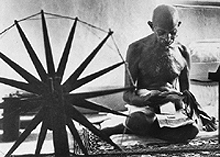Modern British History has had a long and distinguished career at the University of Illinois, sustained by the ongoing, if changing, significance of Britain and its empire to world history and contemporary political, social and cultural questions. Scholarship in British history is more robust than ever, drawing on methodological approaches from colonial studies, postcolonial theory and women's, feminist, legal and cultural history.
 The British History field at Illinois, "Britain and the Empire-Commonwealth from 1688," takes these new approaches into account without sacrificing attention to either empirical research or those "national" narratives which continue to have relevance even as globalization has become the watchword of the present generation. Thus, students who specialize in Modern Britain are encouraged to ground themselves in both the political trajectories and the cultural politics of the imperial nation state from its seventeenth century origins through decolonization. Particular attention is paid to the British empire in India and Africa, to the impact of imperialism on metropolitan society in the nineteenth century and to decolonization and its reverbertatons. The relationship of Britain to Europe, especially through imperial concerns and contemporary issues like Brexit, is an integral part of the graduate program in the field. We encourage and support comparative and interdisciplinary approaches as well. Gender and sexuality are considered critical analytical tools for historical thinking, and their intersection with race, class, religion, and nation are treated as equally crucial for understanding modernity and related subjects in the British/imperial context. The department's growing interest in transnational and global perspectives articulated through courses that interrogate the nation and offer models of non-national investigative methods means that students who come to study "Britain" will have the opportunity to be trained in a variety of conceptual and methodological approaches. Courses offered focus on Victorian Politics and Imperial Culture, Subaltern Studies and Postcolonial Theory, Britain in the Global Eighteenth Century, British Science and Medicine in International Context, and Gender and Colonialism Perspective. Graduate students specializing in Modern Britain are expected to do archival research in the United Kingdom and relevant colonial archives and are encouraged to gain teaching experience in both national and comparative/transnational history.
The British History field at Illinois, "Britain and the Empire-Commonwealth from 1688," takes these new approaches into account without sacrificing attention to either empirical research or those "national" narratives which continue to have relevance even as globalization has become the watchword of the present generation. Thus, students who specialize in Modern Britain are encouraged to ground themselves in both the political trajectories and the cultural politics of the imperial nation state from its seventeenth century origins through decolonization. Particular attention is paid to the British empire in India and Africa, to the impact of imperialism on metropolitan society in the nineteenth century and to decolonization and its reverbertatons. The relationship of Britain to Europe, especially through imperial concerns and contemporary issues like Brexit, is an integral part of the graduate program in the field. We encourage and support comparative and interdisciplinary approaches as well. Gender and sexuality are considered critical analytical tools for historical thinking, and their intersection with race, class, religion, and nation are treated as equally crucial for understanding modernity and related subjects in the British/imperial context. The department's growing interest in transnational and global perspectives articulated through courses that interrogate the nation and offer models of non-national investigative methods means that students who come to study "Britain" will have the opportunity to be trained in a variety of conceptual and methodological approaches. Courses offered focus on Victorian Politics and Imperial Culture, Subaltern Studies and Postcolonial Theory, Britain in the Global Eighteenth Century, British Science and Medicine in International Context, and Gender and Colonialism Perspective. Graduate students specializing in Modern Britain are expected to do archival research in the United Kingdom and relevant colonial archives and are encouraged to gain teaching experience in both national and comparative/transnational history.
Historians of Britain and Empire
- Ikuko Asaka - (Ph.D., University of Wisconsin-Madison, 2010), African American Diaspora and Transnational History, Race, Intimacy, and Empire, Gender and Sexuality, U.S. in the World to 1877
- Antoinette Burton - (Ph.D., University of Chicago, 1990), Modern Britain; South Asian women; feminist/cultural theory; women in the British empire.
- Teri Chettiar (Ph.D. Northwestern, 2013) Britain and Europe, human sciences, gender and sexuality
- James Brennan - (Ph.D. Northwestern University, 2002), Africa, South Asia, political thought, urbanization, media, Islam
- Dana Rabin - (Ph.D. University of Michigan, 1996), Early Modern Britain; legal, cultural, and gender history.
- David Sepkoski - (Ph.D, University of Minnesota, 2002) history of science, Darwin, biology of race
Associated Faculty in Modern European History
- Eugene Avrutin - (Ph.D. University of Michigan, 2004) Department of History: Modern European Jewish History, emphasis Russia
- Teresa Barnes - (Ph.D. University of Zimbabwe, 1994) Department of History: Women, gender and feminist histories in Zimbabwe and South Africa
- Tamara Chaplin- (Ph.D. Rutgers, 2002) Department of History, Cultural and intellectual history of modern France, the history of women, gender, and sexuality, and the history of the media
- Peter Fritzsche - (Ph.D. University of California, Berkeley, 1986) Department of History: Germany, Europena, Cultural History
- Craig Koslofsky - (Ph.D. University of Michigan, Ann Arbor, 1994) Department of History: early modern Germany, Renaissance, Reformation
- Emanuel Rota - (Ph.D. University of California, Berkeley, Department of Spanish, Italian, and Portuguese: 19th and 20th century intellectual history, Fascism, critical theory, Marxism and postmarxism
Affiliated Faculty
- Manisha Basu - (Ph.D. University of Pittsburgh ) Department of English: Postcolonial Theory and Literatures, Nationalism and Philology, Secularism, Globalization, African Literatures, Literary Theory and Cultural Studies, South Asian Literatures and Cultures, Language and Imperialism.
- Hina Nazar - (Ph.D. Johns Hopkins University, 2004) Department of English: British literature and culture of the long eighteenth century; Enlightenment political and moral theory (especially Locke, the Scottish Enlightenment, Rousseau, and Kant); the philosophy of education; Hannah Arendt and critical social theory; George Eliot; feminist theory